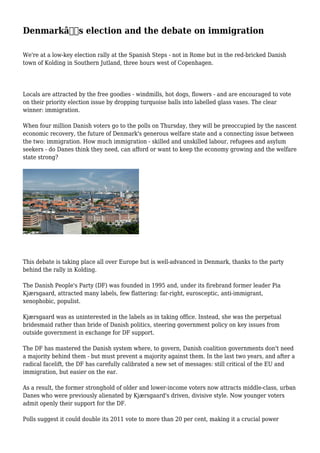
Denmark’s election and the debate on immigration
- 1. Denmark’s election and the debate on immigration We're at a low-key election rally at the Spanish Steps - not in Rome but in the red-bricked Danish town of Kolding in Southern Jutland, three hours west of Copenhagen. Locals are attracted by the free goodies - windmills, hot dogs, flowers - and are encouraged to vote on their priority election issue by dropping turquoise balls into labelled glass vases. The clear winner: immigration. When four million Danish voters go to the polls on Thursday, they will be preoccupied by the nascent economic recovery, the future of Denmark's generous welfare state and a connecting issue between the two: immigration. How much immigration - skilled and unskilled labour, refugees and asylum seekers - do Danes think they need, can afford or want to keep the economy growing and the welfare state strong? This debate is taking place all over Europe but is well-advanced in Denmark, thanks to the party behind the rally in Kolding. The Danish People's Party (DF) was founded in 1995 and, under its firebrand former leader Pia Kjærsgaard, attracted many labels, few flattering: far-right, eurosceptic, anti-immigrant, xenophobic, populist. Kjærsgaard was as uninterested in the labels as in taking office. Instead, she was the perpetual bridesmaid rather than bride of Danish politics, steering government policy on key issues from outside government in exchange for DF support. The DF has mastered the Danish system where, to govern, Danish coalition governments don't need a majority behind them - but must prevent a majority against them. In the last two years, and after a radical facelift, the DF has carefully calibrated a new set of messages: still critical of the EU and immigration, but easier on the ear. As a result, the former stronghold of older and lower-income voters now attracts middle-class, urban Danes who were previously alienated by Kjærsgaard's driven, divisive style. Now younger voters admit openly their support for the DF. Polls suggest it could double its 2011 vote to more than 20 per cent, making it a crucial power
- 2. broker in the next Folketing parliament. 'Uncomfortable' Back in Kolding, the chatty local candidate Kristine Jorgensen is one of the DF's new breed. "We're not against immigration but many Danes are uncomfortable with outsiders getting payments from a system they have never paid into," she said. As she talks, the man responsible for the DF's rising fortunes arrives: the leader since 2012, Kristian Thulesen Dahl. "He's very skilled," whispers Kristine Jorgensen in admiration. Perceptive and mild-mannered, and willowy in appearance, Dahl adopts a reasoned but firm tone in political debates. When talking to voters one-on-one in Kolding, he demonstrates charm galore. Dahl says the economic cost of immigration is unacceptable and the current system, as managed by the outgoing Social Democrat government, is too lenient. "If Danish people think that the immigration situation is out of control when we have the Social Democrats in power, that will help us to win," he says. Tough-talking campaign Anticipating a DF attack in this election, the Social Democrats launched a tough-talking campaign in January, demanding that outsiders who come to Denmark must work. But DF strategists are planning a fight-back, confident that voters still trust them more on the issue. As immigration becomes a Danish battle ground not seen since the 1990s, opinion is divided over whether or not the DF has radicalised mainstream political opinion on the issue. One camp fears the larger parties have, for different political reasons, taken the populist DF bait and put Denmark on a populist path towards immigration it can ill afford, given its ageing population and falling birthrate.